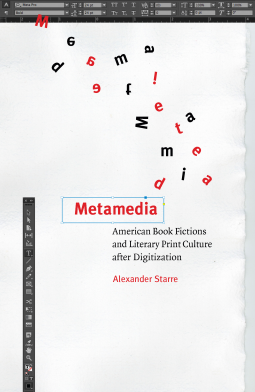
Metamedia
American Book Fictions and Literary Print Culture after Digitization
by Alexander Starre
This title was previously available on NetGalley and is now archived.
Send NetGalley books directly to your Kindle or Kindle app
1
To read on a Kindle or Kindle app, please add kindle@netgalley.com as an approved email address to receive files in your Amazon account. Click here for step-by-step instructions.
2
Also find your Kindle email address within your Amazon account, and enter it here.
Pub Date Aug 15 2015 | Archive Date Dec 01 2015
University of Iowa Press | Impressions
Description
Combining sustained textual analysis with impulses from the fields of book history, media studies, and systems theory, Starre explains the aesthetics and the cultural work of complex material fictions, such as Mark Z.Danielewski's House of Leaves (2000), Chip Kidd's The Cheese Monkeys (2001), Salvador Plascencia's The People of Paper (2005), Reif Larsen's The Selected Works of T. S. Spivet (2009), and Jonathan Safran Foer's Tree of Codes (2010). He also broadens his analysis beyond the genre of the novel in an extensive account of the influential literary magazine McSweeney's Quarterly Concern and its founder, Dave Eggers.
For this millennial generation of writers and publishers, the computer was never a threat to print culture, but a powerful tool to make better books. In careful close readings, Starre puts typefaces, layouts, and cover designs on the map of literary criticism. At the same time, the book steers clear of bibliophile nostalgia and technological euphoria as it follows writers, designers, and publishers in the process of shaping the surprising history of literary bookmaking after digitization.
Advance Praise
“Starre’s Metamedia is a definitive achievement: lucid, searching, comprehensive, and repeatedly eye-opening.”—Garrett Stewart, author, Bookwork: Medium to Object to Concept to Art
“Alexander Starre’s Metamedia is a detailed, carefully argued account of an important new development in contemporary literature, an exceptionally generous, patient, and at times revelatory study.”—Evan Brier, author, A Novel Marketplace: Mass Culture, the Book Trade, and Postwar American Fiction
Available Editions
| EDITION | Paperback |
| ISBN | 9781609383596 |
| PRICE | $55.00 (USD) |
Links
Average rating from 4 members
Featured Reviews
Want to start a conversation with me at a party? Mention House of Leaves. I’ll wax ecstatic on Mark Z. Danielewski’s Metamediamasterpiece for hours. So of course I loved Metamedia, an exploration of literature in the digital age, which uses House of Leaves as its jumping-off point.
For those unfamiliar with Danielewski’s debut novel, it’s… well, it’s not easy to explain. The five-word synopsis I’d offer is that it’s a found-footage film in book form, but what does “book” mean here? Sure, it’s on paper, with binding, but with its manipulation of text (sometimes sideways or upside-down or spread over numerous pages) Leaves could never be reduced to just the words themselves.
This leads Starre to ask, “How does the idea of a literary work change when we think of it not as a text, but as an embodied artifact?”
As a lover of both physical books and digital technology, I have no bias in this area. I have a classic Nook, a Kindle tablet and boxes of books that I won’t get through in my lifetime. I’ll read any time, any place, any way, and I appreciate the tone with which Starre discusses the topic.
If you’re looking for a work that romanticizes the digital frontier or deifies the paperback, this is not it. Metamedia applies history and theory and offers a unique perspective that will be of interest to academics and general readers.
And will hopefully inspire those who haven’t to read House of Leaves.





